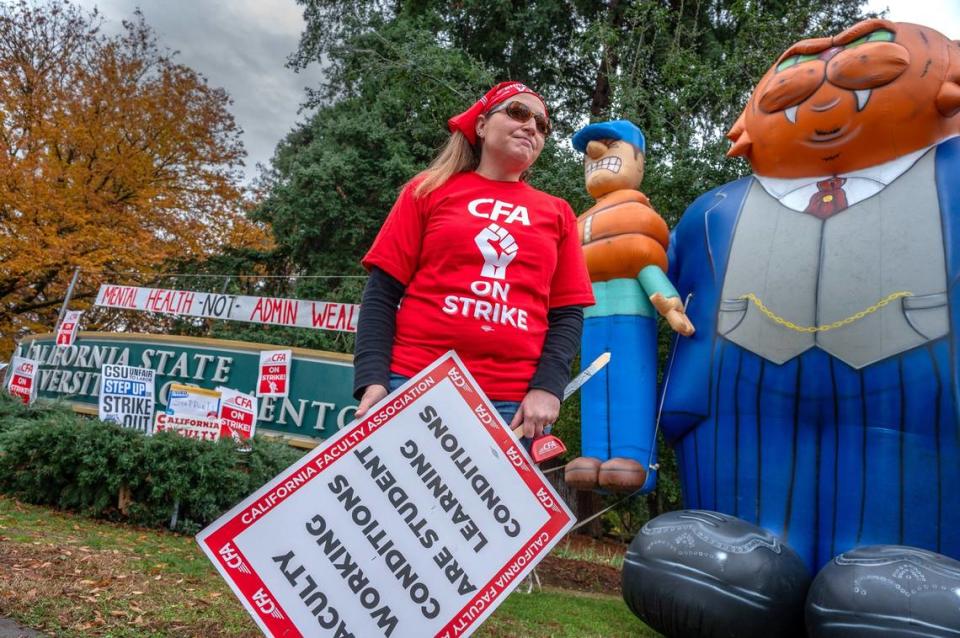Sacramento State staff, students walk picket lines in CSU faculty union’s rolling strike
Summer might be over, but the “hot labor” movement that started months ago has yet to cool down. Call it “solidarity season,” if you will.
Faculty across the California State University system are the latest employees to walk off the job and onto the picket lines. The California Faculty Association, which represents close to 29,000 professors, lecturers, librarians, counselors and coaches across CSU’s 23 campuses, staged strikes at campuses in Pomona, San Francisco and Los Angeles earlier this week.
The four-day rolling strike finally reached California’s capital city Thursday. Several hundred Sacramento State professors, lecturers and students congregated at various entrances to the 305-acre campus from dawn until dusk. They marched through the streets waving signs that bore messages such as, “Fair pay pays off,“ and “What is my tuition for? Pay my teachers.”
The Sacramento State labor action comes on the heels of a historic three-day strike by state scientists — the first for a state civil service union — and a one-day work stoppage by Teamsters 2010, which represents CSU’s skilled trades workers.
“We desperately need pay raises,” said Danielle Duckett, who’s taught in Sacramento State’s sociology department for 10 years. “I cannot support my two kids, I cannot afford housing, on what I make as a lecturer.”

At the heart of the faculty’s ask is a 12% pay raise to stay ahead of inflation. They also want a minimum of one semester or two quarters of parental leave, plus greater access to gender-inclusive restrooms in campus buildings and more staff mental health counselors to help students. Following four months of bargaining, the union and the university hit an impasse in August. They then engaged in mediation talks with a third-party negotiator and submitted to fact-finding with a neutral panelist.
Only after exhausting those impasse processes could the union stage labor actions. CFA members authorized a strike last month with 95% of those voting in support.
“We respect the right of our labor unions to engage in strike activities, and we are prepared to minimize any disruptions to our campuses,” said Leora Freedman, the Cal State system’s vice chancellor for human resources, in a statement released last Friday. The statement accompanied the release of the neutral fact-finder’s report.
“Our hope is that the planned strike activities pose no hardships on our students and that we can get back to the bargaining table as soon as possible with the CFA to come to an agreement.”
Faculty have previously held a strike only once, in 2011, when members walked out on two campuses to protest budget cuts. The union prepared to strike in 2016, but the university came back to the table just before the strike began. Other strike authorizations, including during contract negotiations in 2007 and 2012, were averted by settlements with the administration.
Why faculty, students and allies showed up to strike
As Duckett marched the picket line, blocking the J Street entrance to the university, she described how a lecturer’s financial life hinges on whether the university chooses to renew their limited-term teaching contracts. Her husband, a professor of physics, has greater job stability, but he doesn’t make much more money than she does.
The mother of two said her monthly expenses often exceed her take-home pay. Duckett frequently takes on hundreds of dollars in credit card debt each month.
“We’re having to work at multiple campuses,” Duckett said, “while our administrators are making obscene amounts of money.”
Duckett pointed out that CSU’s recently appointed chancellor Mildred Garcia earns a salary of nearly $800,000 a year, plus a $1,000 monthly auto stipend and $8,000 per month for housing.
“If I had $8,000 a month in a housing allowance, it would be life-changing,” Duckett said.
Faculty members didn’t walk the picket lines alone. A handful of Teamsters members and several groups of students also endured the chilly temperatures and sporadic sprinkles of rain.
“The CSU is trying to divide us,” said Avery Schick, a Teamsters member and maintenance worker in student housing facilities. “I’m out here to support (CFA) because we are a whole together. And together we support the students.”
Several of those students turned out to show support for their instructors, including sisters Andrea and Aurora Uribe, along with their friend and classmate Marissa Dunn.
“We kinda just came out to see what it was, and then started talking to people about it and learned more details about the reasons behind it, so we decided to jump in and support,” Dunn said.
The three students said increasing paid parental leave for faculty was one of the most important issues, as well as increasing counselor resources for student mental health.
“We just wanted to come out and show our support for our teachers,” said Andrea Uribe, who studies political science and will graduate next week.
“They do a great job of protecting our mental health, especially during finals,” she added, “so if we could return that favor, it would be worth it.”

